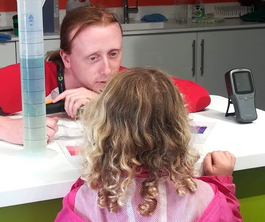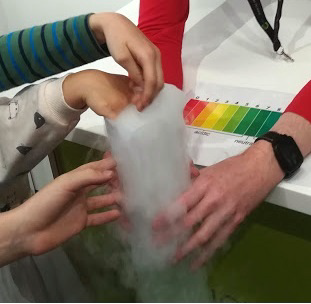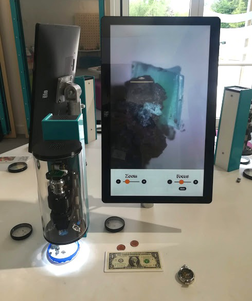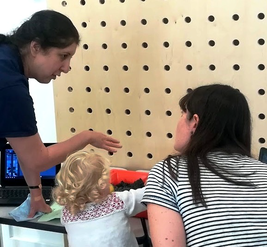Oxford Green Week
Oxford Green Week, which ran from 8-16th June, saw pop-up green events appearing across the city, from recycling to food projects, wildlife watches to cycle rides, and amongst them was the ECG’s outreach event at the Science Oxford Family Open Day. The event saw over 100 visitors, spread out across three activity sessions during the day.
|
The new Science Oxford Centre at Stansfeld Park is a purpose-built exploration zone, workshop space and theatre set in 15-acres of woodland. The theme is “see the world differently”, and the exhibits are designed to get children and families designing their own experiments and making discoveries. During the soft launch period, Science Oxford are offering a series of family open days, and on 15th June they invited the ECG to run some fun, engaging activities for the public. Plunged into the Exploration Zone, we set up our activity alongside a series of exhibits, including scarf-shooting, circuit-making and puzzle challenges.
|
One of our activities was ‘Microplastics’: a hands-on activity where participants use lights, microscopes and tweezers to search through soil debris looking for traces of small pieces of plastic; we provided two soil samples: some light composting soil and the heavy clayey earth found in the woodland outside. This material proved of great interest to our visitors; indeed, one very young girl even began modelling with it. In addition to our usual equipment, we made use of the centre’s new microscopes: some hand held probes attached to laptops and some higher powered ones for looking at insects, watching mechanisms, or (in our case) observing microplastics in petri dishes.
|
We also presented ‘Ocean Acidification’, a demo using dry ice and pH 8-9 water to demonstrate the devastating effect of rising carbon dioxide emissions on our oceans. By using a large measuring cylinder for the experiment and filling it just half way with the water, participants were able to touch the vapour given off and learn more about the behaviour and properties of carbon dioxide.
|
Our third activity was ‘River Water Testing’, where a water sample from the Peak District and one from the pond in the Science Oxford woodlands were compared in terms of pH, water hardness and ammonia using test strips. Many of the adult visitors predicted that the local water would be harder than the Peak District sample because of their experience with limescale and shampoo-foaming challenges.
Finally, visitors were also able to explore some environmental monitors, including an air quality sensor and Geiger Muller Counter.
Visitors were guided by our fantastic volunteers, Omofolawe Otun, Niall Marsay, and Fero Ibrahimi, who gave up their time to learn the activities and showcase their research and that of other environmental scientists. We were also joined by Explorer Scouts from Abingdon: Michael Pritchett, Adam Newton, and Toby Littlejohn, who “science busked” round the centre, engaging visitors with the monitors.
The relaxed atmosphere meant that there was also plenty of time to engage with parents who were interested to know more about environmental chemistry. This engagement included giving advice to parents with older children for work experience opportunities, additional reading, and university courses that included environmental science. We also discussed how environmental science is taught in schools, and further opportunities for local scientists to engage with the public, including with one visitor from the Environment Agency. One parent was very interested in how insects could impact the earth, from materials such as silkworm silk to replace plastics, to increasing biodiversity sites near farms to naturally reduce the demand for pesticides, to the impact on land use, energy and water consumption of replacing meat in the diet.
Finally, visitors were also able to explore some environmental monitors, including an air quality sensor and Geiger Muller Counter.
Visitors were guided by our fantastic volunteers, Omofolawe Otun, Niall Marsay, and Fero Ibrahimi, who gave up their time to learn the activities and showcase their research and that of other environmental scientists. We were also joined by Explorer Scouts from Abingdon: Michael Pritchett, Adam Newton, and Toby Littlejohn, who “science busked” round the centre, engaging visitors with the monitors.
The relaxed atmosphere meant that there was also plenty of time to engage with parents who were interested to know more about environmental chemistry. This engagement included giving advice to parents with older children for work experience opportunities, additional reading, and university courses that included environmental science. We also discussed how environmental science is taught in schools, and further opportunities for local scientists to engage with the public, including with one visitor from the Environment Agency. One parent was very interested in how insects could impact the earth, from materials such as silkworm silk to replace plastics, to increasing biodiversity sites near farms to naturally reduce the demand for pesticides, to the impact on land use, energy and water consumption of replacing meat in the diet.
|
Volunteer with us
If you’ would like to participate in a similar activity, get involved in a future ECG outreach event. Our next event on the 19th and 20th October is part of the IF Oxford festival of ideas. During these two days, held at the Westgate Shopping Centre and Oxford Town Hall, the ECG will present the activities mentioned in this report, and we are looking for volunteers. The IF Festival typically attracts thousands of visitors to these Explorazones over the two-day event. Email [email protected] to get involved or make enquiries. Training will be provided on the day. |
Bring outreach to you
If you’d like to run your own similar activity, please check out our previous Bulletins and webpages for details of the activities, including an outline and cost estimate for exhibits. Details of the ‘Ocean Acidification’ demo may be found on page 22 of this Bulletin, whilst ‘Microplastics’ is explained in the July 2018 edition, and both appear online at envchemgroup.com/resources. Risk assessments are also available online. You are welcome to replicate any of our outreach activities yourself, and we are always happy to answer questions about them. If you want our help running outreach activities for your event or would like us to help source volunteers, email [email protected].
Tell us about your activities
We know many of our members are already highly active with outreach activities. If you have developed an activity, you can disseminate it to other readers by writing a ‘Public Engagement How-To’, or creating a summary report to share your success. Please contact the editors for more information.
If you’d like to run your own similar activity, please check out our previous Bulletins and webpages for details of the activities, including an outline and cost estimate for exhibits. Details of the ‘Ocean Acidification’ demo may be found on page 22 of this Bulletin, whilst ‘Microplastics’ is explained in the July 2018 edition, and both appear online at envchemgroup.com/resources. Risk assessments are also available online. You are welcome to replicate any of our outreach activities yourself, and we are always happy to answer questions about them. If you want our help running outreach activities for your event or would like us to help source volunteers, email [email protected].
Tell us about your activities
We know many of our members are already highly active with outreach activities. If you have developed an activity, you can disseminate it to other readers by writing a ‘Public Engagement How-To’, or creating a summary report to share your success. Please contact the editors for more information.





